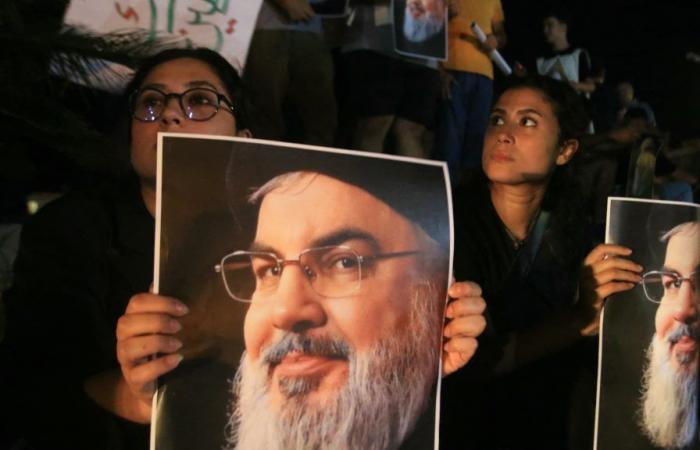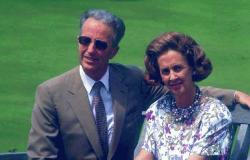“He was the man everyone was waiting for, the people who love him, those who hate him,” reacts a resident of Beirut to the announcement of the death of Hassan Nasrallah, killed in an Israeli strike on Friday . Like many Lebanese, worry and fear for the future predominate and most are now thinking of leaving the country.
Hezbollah, a powerful Shiite group allied with Palestinian Hamas at war against Israel in the Gaza Strip, confirmed on Saturday September 28 the death of its leader Hassan Nasrallah in an Israeli bombing on Friday in the southern suburbs of Beirut, stronghold of the movement.
Residents who hoped that the death of the leader of the Shiite movement would end the war are waking up feeling groggy. The objective claimed by Israel is to completely eliminate the militia party but this strategy worries many Lebanese who fear seeing the country’s fragile political balance collapse. “His death leaves us without a guide,” confides, moved, a Shiite resident of Beirut at the microphone of RMC.
>> Follow our live broadcast dedicated to news in Lebanon and the Middle East
When the Hezbollah press release confirming the death of Hassan Nasrallah began to be broadcast by the media, radio and television but also on social networks, on Saturday, the entire country froze. For part of the population, Hassan Nasrallah was a figure, a hero. Along the streets, men and women collapse, scream and hide their tears.
Cult of personality
At the head of Hezbollah since 1992, Hassan Nasrallah, 64, was a man of religion who was the subject of a veritable cult of personality among the Shiite community in Lebanon. For years he had lived in hiding and rarely appeared in public.
In Christian neighborhoods, the military presence and controls are reinforced. We fear provocations or violence from Hezbollah militiamen. No one here wants to relive the tragic years of the Lebanese civil war until the 90s.
“I don’t want anyone to die.”
Others are caulked. The sound of Tony’s backgammon echoes in the silence of the Ashrafieh Christian neighborhood. “I don’t want anyone to die, Nasrallah was Lebanese after all, but I would have preferred that he not go to this war”, he declared on the microphone of RMC, while they were a few meters from him armed soldiers.
Sarah fears internal chaos: “Because there are people who are happy and others who cry, I don’t know if there will be clashes between the communities but I hope not.”
The young Shiite, moved, admits that she does not yet believe in the death of the leader of Hezbollah. “He was the man everyone was waiting for, the people who love him, those who hate him,” she comments.
“We were waiting for Nasrallah on television to see what he was going to say, the words, the future, the goal! Where are we going, what are we doing?” explains Sara, a Shiite resident of Beirut
It’s an entire community that is disoriented and a future that is now uncertain for the country, underlines Samer. “Either the Israelis push their advantage, so they continue to bomb, or things calm down on the other side and they stop. We don’t know!”
“Nasrallah was THE terrorist,” says Netanyahu
“We have settled accounts with the person responsible for the murder of countless Israelis and many citizens of other countries,” Israeli Prime Minister Benjamin Netanyahu said. “Nasrallah was not a terrorist like the others. He was THE terrorist, he was the pivot of the axis, the central engine of the Iranian axis of evil,” he also declared.
Prohibited gathering of more than 1,000 people
All day long, tension continued to rise in Beirut. What will the supporters of Hassan Nasrallah who are still alive do now? There are several tens of thousands of them. No one sees them giving up the fight. Some communities fear that they will seek revenge for this humiliation.
Lebanese authorities have banned any gathering of more than 1,000 people for the coming days. But the funeral of Hassan Nasrallah, the date of which is not yet known, could bring together several hundred thousand people in the streets of Beirut.
Flee the country
The wait is painful. Many Beirut residents are looking to leave. Each Lebanese met, who has another nationality or a visa for a foreign country, does not hide the fact that he asks the question. The Franco-Lebanese are in contact with the French embassy which, for the moment, is not giving any instructions to those present on Lebanese territory.
Ali, a young Lebanese from the south of the country who had found refuge in Beirut fleeing the bombs, tried to go to Turkey but could not find a flight because fewer and fewer companies still serve Beirut airport.
And then there is the case of the Syrians. There have been several hundred thousand refugees in Lebanon since the start of the Syrian civil war in 2011. According to the UN, nearly 50,000 of them crossed the border in the other direction, returning to Syria this week. An unprecedented influx of returns which shows to what extent almost everyone here is trying to escape the war.
Marion Gauthier and Nicolas Ropert with Léo Manson and AFP






